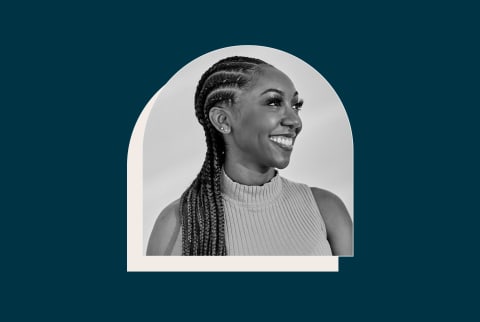Advertisement
Tune In: Toxic Burden Disproportionately Affects Black Women — What To Know


Research has shown, time and again, that the burden of toxicity from personal care and beauty products disproportionately affects women of color. In fact, a 2017 study from the American Journal of Obstetrics & Gynecology warned that exposure to hormone-disrupting ingredients in beauty products was an "underappreciated source of reproductive harm and environmental injustice."
It has tangible repercussions too: Recently there was a shocking report that connected ingredients found in hair relaxers to cancer. The 2022 study found there are many adverse health risks associated1 with hair relaxers, including an increase in uterine cancer risk.
And unfortunately, the potential concerns don't stop there, notes sustainability and nontoxic beauty entrepreneur Ciara Imani May, founder of Rebundle, a plant-based and fully recyclable hair extension company used in braids and protective styling for Black women.
"The issues [with waste and toxicity] that I identified with synthetic hair scared me. Once I understood that normal synthetic hair was made from frowned-upon materials and ingredients, I thought, Well, how did it make its way on my head and so many other people's heads if everybody else seems to know this?" she told me on this episode of Clean Beauty School.
In this episode, I chat with May about the burden of toxicity experienced by women of color, the short- and long-term consequences of scalp inflammation, and why we need better hair care solutions for Black women.
Hair care toxicity, scalp inflammation & environmental waste
May says she first started questioning the materials and coating used for extensions due to the itch and irritation they caused. So, she dug in—even sending samples from the most popular brands to a lab, which, as she's quoted as saying earlier, "scared her."
As we discuss in the episode, these products are made out of polyvinyl chloride (PVC, or commonly called vinyl) and other low-grade acrylics. "I found out that these are one of the hardest materials to recycle because of the chemical, chloride, that's on the product," she says.
But it's not just about the recyclability. It's what's actually happening on the scalp: "Many people develop contact dermatitis. That's a signal or response that the body is rejecting these ingredients, which got me concerned about what's happening internally or at the chemical level," she says, noting that inflammation like that could trigger "adverse health reactions that we may not even realize for 20 to 30 years from now."
And as May explains in the episode, she wants to see a broader conversation about what greener, better beauty looks like for all people.
"This isn't the first beauty product in history to later discover that it could be causing some adverse health reactions. It's important to be educated on what is safe, what's not, and what does 'better' even look like," she says. Beauty should bring joy to our lives, but at what cost?"
For more insights, tune in below.